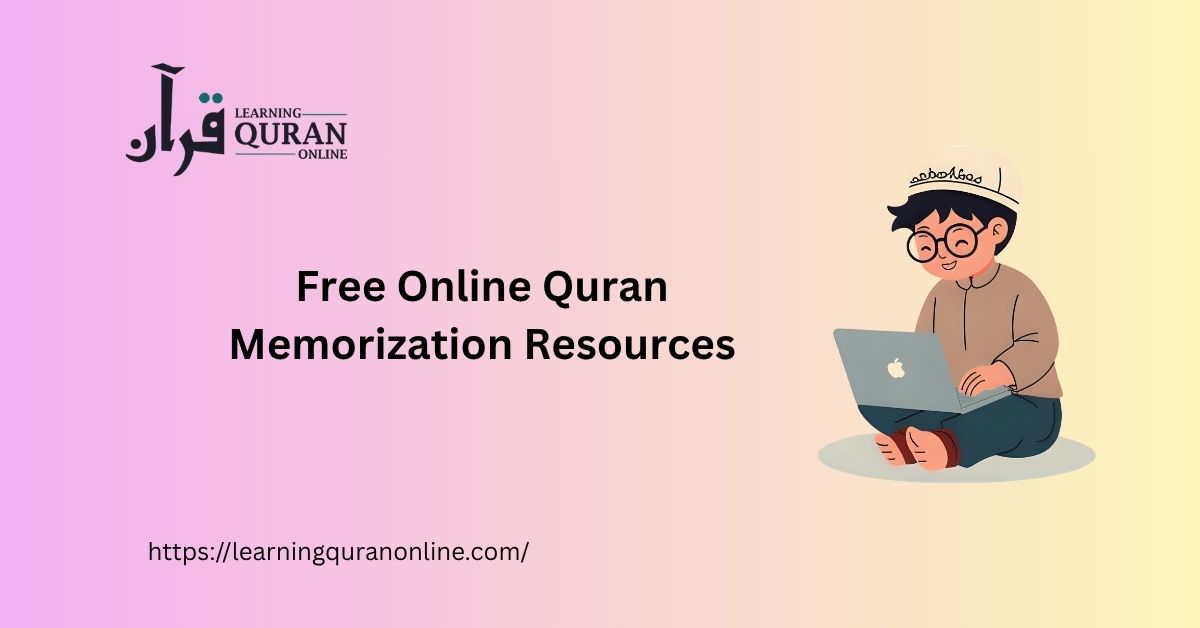Table of Contents
ToggleWhy Use Free Online Quran Memorization Resources?
Free online Quran memorization resources remove many barriers to learning: they make high-quality recitation audio, tajweed lessons, and virtual teachers available around the clock, often at no cost. Learners can access interactive tools, spaced-repetition systems, and community groups that help with accountability and consistent review. Whether you want to memorize the Quran online for the first time, restart your Hifz, or support your children in memorizing the Quran, there are options that fit different learning styles and budgets.
Types of Free Quran Memorization Resources
Different learners need different tools. Below are the main categories of free resources that support efficient Quran memorization:
- Digital Quran text and audio libraries: Parallel Quran pages, multiple reciters, and repeat options help you learn verses precisely.
- Recitation feedback apps: AI and audio analysis apps that let you compare your recitation to a master reciter for tajweed accuracy.
- Free tajweed lessons and video courses: Step-by-step tajweed tutorials and correction videos on platforms like YouTube.
- Memorization apps and flashcards: Tools using spaced repetition, chunking, and review scheduling to retain memorized portions.
- Virtual halaqas and community forums: Online groups and social platforms for group memorization, accountability, and peer correction.
- Audio-only resources and podcasts: Continuous listening to reciters to internalize melody, pauses, and proper pronunciation.
Quran Memorization (Hifz) Complete Guide
Top Free Tools and Platforms to Memorize Quran Online
Below are categories and examples of widely used free resources. Use a mix of them to create a balanced memorization program.
1. Digital Quran Websites (Text + Audio)
Websites that provide the Quran text along with robust audio features are essential. They allow you to read, repeat, and compare recitations while following the script.
- Quran text with multiple reciters and repeat modes — ideal for listening and echoing.
- Parallel translations and transliteration for non-Arabic speakers to understand meaning while memorizing.
- Downloadable MP3 recitations for offline listening during commutes or chores.
2. Recitation Feedback and Practice Apps
Apps that analyze recitation help refine tajweed and fluency. Many offer free features that are extremely useful in the Hifz process.
- Record-and-compare functionality to follow a model reciter line by line.
- Pronunciation highlights and tips for tricky letters and rules.
3. Free Tajweed Courses and YouTube Channels
Video lessons are excellent for visual learners who need to see tongue and mouth positions, understand tajweed rules, and hear demonstrations. Numerous qualified teachers provide free tajweed sessions covering the basics to advanced rules.
4. Memorization Apps and Spaced Repetition Tools
Implementing a revision schedule is the single most important factor in successful Hifz. Spaced repetition apps help you review verses at scientifically optimized intervals so they move from short-term to long-term memory.
5. Community Halaqas and Online Tutors (Free Sessions)
Many mosques and online platforms run free group Hifz sessions or open virtual halaqas where learners can recite, receive correction, and gain peer motivation. These can be especially helpful for children and beginners.
Practical Quran Memorization Techniques (Online-Friendly)
Combining the right resources with effective techniques accelerates progress. Below are proven methods suited to online learning:
- Chunking: Break a surah into short, manageable pieces (2–6 ayahs) before combining them.
- Listen and repeat: Use high-quality recitation audio—listen multiple times, then recite along, and finally recite without audio.
- Spaced repetition: Schedule reviews using apps or calendar reminders—daily, then every 3 days, weekly, biweekly, and monthly for long-term retention.
- Write it down: Copying verses by hand improves visual memory and attention to detail.
- Tajweed first: Learn correct pronunciation as you memorize to prevent reinforcement of mistakes.
- Active recall: Test yourself without looking instead of constantly rereading the text.
- Use meaning and translation: Understanding the verse’s meaning helps cement the words in memory.
Creating a Sustainable Memorization Schedule
A realistic daily plan prevents burnout and ensures consistency. Here is a sample weekly structure that you can adapt to your pace and responsibilities:
- Daily (20–60 minutes): New memorization (10–20 minutes), revision of recent memorized portions (10–20 minutes), listening practice (5–20 minutes).
- Weekly: Recite memorized portions to a teacher or group for correction and accountability.
- Monthly: Deep revision of earlier memorized sections to maintain fluency.
- Accountability: Join an online halaqa or find a memorization buddy for weekly checks.
Best Online Hifz Programs Compared
Tips for Different Learners: Kids, Teens, Adults
Age and lifestyle affect the pace and methods for Hifz. Tailor your approach accordingly:
- Children: Short, frequent sessions with visual aids, songs, and rewards. Use kid-friendly memorization apps and colorful flashcards.
- Teens: Combine peer group sessions, structured apps, and tajweed classes. Encourage responsibility and leadership in group recitations.
- Adults: Use audio immersion—listen during commutes, household tasks, and prayer. Balance between new memorization and consistent revision.
How to Choose the Right Free Resource
When selecting free online resources for Quran memorization, consider the following criteria:
- Accuracy: The Quran text and audio must be from reputable sources and follow Uthmani script if possible.
- Tajweed quality: Look for tools that emphasize correct pronunciation and offer correction.
- Usability: A clean interface and repeat/loop features make memorization tasks much easier.
- Community and teacher access: Free isn’t limited to self-study—many free platforms connect you with volunteer teachers or group halaqas.
- Offline features: Downloadable audio helps maintain consistency when you don’t have internet access.
Common Challenges and How Free Online Tools Help
Many Hifz learners face similar obstacles. Here’s how to tackle them with online resources:
- Forgetting old memorization: Use spaced repetition apps and schedule weekly reviews.
- Tajweed mistakes: Record your recitation and use feedback tools or upload to teacher forums for correction.
- Lack of motivation: Join online halaqas, participate in memorization challenges, and set small milestones.
- Inconsistent time: Leverage short audio sessions and memorize during spare minutes—apps with repeat modes are ideal.
Complete Guide to Online Quran Memorization
Where to Start Right Now
Begin with a simple plan:
- Choose one reputable digital Quran platform with audio and repeat functionality.
- Pick a small portion to memorize (2–4 ayahs) and use the listen-repeat method until confident.
- Join one free online tajweed video or a weekly virtual halaqa to get feedback.
- Set up a spaced-repetition schedule to review what you memorize.
- Record your recitation weekly and compare or ask a teacher to listen.
Final Thoughts — Combining Technology with Traditional Methods
Free online Quran memorization resources provide powerful support, but combine them with guidance from qualified teachers and community accountability for best results. Using reputable audio reciters, tajweed lessons, spaced repetition systems, and virtual halaqas will significantly increase the speed and permanence of your memorization. Whether you’re memorizing the Quran for the first time, helping your children with Hifz, or refreshing old memorization, the tools outlined above can form the backbone of a sustainable, effective program.
If you’re seeking a structured online approach with both self-study tools and teacher feedback, consider exploring recognized online academies and community halaqas. For example, Learning Quran Online integrates many of these techniques into its programs to help learners succeed in their Hifz journey.
Quick Resource Checklist
To recap, start with these free essentials:
- Digital Quran text with audio and repeat/loop features
- Recitation feedback app or record-and-playback tool
- Free tajweed video lessons or YouTube channels
- Spaced repetition memorization app or flashcards
- Online halaqa or peer accountability group
With consistent effort, the right free online resources, and a supportive community, memorizing the Quran is an achievable and spiritually enriching goal. Begin today with a clear plan, small daily steps, and patience.
















